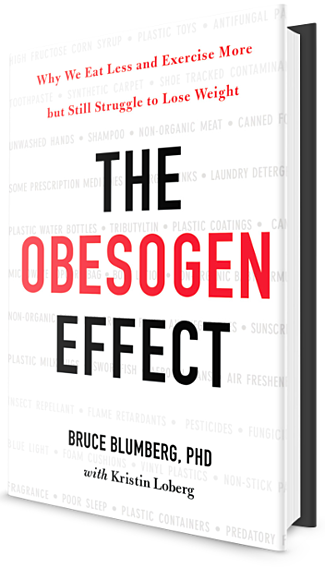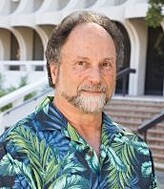Obesity and obesity-related disorders such as type 2 diabetes and coronary artery disease have become an epidemic of global proportions. Excessive consumption of calorie-dense food and diminished physical activity (the “Couch Potato model”) are the generally accepted causal factors for obesity. But can environmental factors play a role in exposing preexisting genetic differences or amplifying the effects of diet and exercise?

Dr. Bruce Blumberg, who coined the word obesogen in a 2006 publication, is the father of the field. Dr. Blumberg is Professor of Developmental and Cell Biology, Pharmaceutical Sciences, and Biomedical Engineering at UC Irvine, and his laboratory’s “obesogen hypothesis” proposes the existence of environmental chemicals that can perturb lipid homeostasis, adipocyte development, and adipose tissue function. The March 20 release of his new book, The Obesogen Effect: Why We Eat Less and Exercise More but Still Struggle to Lose Weight, by Grand Central Life and Style, an imprint of Hachette Publishing, makes this a perfect time to deepen our understanding of Dr. Blumberg’s work and its wide implications.
In this webinar Dr. Blumberg was joined by Dr. Jerry Heindel, director of Commonweal’s Program in Endocrine Disruption Strategies, who interviewed Dr. Blumberg about his pioneering research, his reasons for writing the book and the impact he hopes it will have, and how to address the obesity epidemic and reduce exposures to obesogens.
Featured Speaker
 Bruce Blumberg, PhD, received his Bachelor’s degree from Rutgers University in 1976 and completed his PhD and postdoctoral studies at UCLA. Dr. Blumberg trained in molecular endocrinology at the Salk Institute for Biological Studies, where he led the effort to identify new hormones that act through so-called “orphan” nuclear receptors. Dr. Blumberg joined the faculty at the University of California, Irvine in 1998 where he is currently Professor of Developmental and Cell Biology, Pharmaceutical Sciences, and Biomedical Engineering.
Bruce Blumberg, PhD, received his Bachelor’s degree from Rutgers University in 1976 and completed his PhD and postdoctoral studies at UCLA. Dr. Blumberg trained in molecular endocrinology at the Salk Institute for Biological Studies, where he led the effort to identify new hormones that act through so-called “orphan” nuclear receptors. Dr. Blumberg joined the faculty at the University of California, Irvine in 1998 where he is currently Professor of Developmental and Cell Biology, Pharmaceutical Sciences, and Biomedical Engineering.
This webinar is one in a monthly series sponsored by the Collaborative on Health and the Environment’s EDC Strategies Partnership. The CHE EDC Strategies Partnership is chaired by Carol Kwiatkowski and Katie Pelch (TEDX), Sharyle Patton (Commonweal Biomonitoring Resource Center), Jerry Heindel (Commonweal Program on Endocrine Disruption Strategies), and Genon Jensen (HEAL) and coordinated by Maria Williams (Collaborative on Health and the Environment, a Commonweal program). To see a full list of past calls and webinars related to EDCs and listen to or view recordings, please visit our partnership page.
This webinar was moderated by Jerry Heindel, PhD, director of Commonweal’s Program in Endocrine Disruption Strategies. It lasted for 30 minutes and was recorded for our call and webinar archive.
